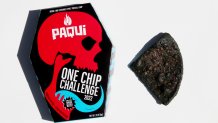Paqui, the maker of the One Chip Challenge, is removing the spicy chips from store shelves six days after a Massachusetts teen died after participating in the viral social media trend.
"The Paqui One Chip Challenge is intended for adults only, with clear and prominent label highlighting the chip is not for children or anyone sensitive to spicy foods or who has food allergies, is pregnant or has underlying health conditions," the company said in a statement posted to its website on Thursday. "We have seen an increase in teens and other individuals not heeding these warnings. As a result, while the product continues to adhere to food safety standards, out of an abundance of caution, we are actively working with our retailers to remove the product from shelves."
Paqui said they are offering refunds on their single-serve One Chip Challenge product. For refunds, call 1-866-528-6848.
Harris Wolobah, a 14-year-old sophomore at Doherty Memorial High School in Worcester, died on Friday, and his mother told NBC10 Boston that the family believes the teenager died of complications from the One Chip Challenge.
We've got the news you need to know to start your day. Sign up for the First & 4Most morning newsletter — delivered to your inbox daily. >Sign up here.
The One Chip Challenge is a social media challenge that involves eating purportedly the spiciest tortilla chip in the world, then waiting as long as possible before eating or drinking something for relief. The chip comes in a coffin container and has a warning that it should be kept away from children, is only for adults to eat, and shouldn't be eaten by anyone who's sensitive to spicy food or with an allergen. Anyone who has difficulty breathing, faints or has extended nausea is urged to seek medical assistance, according to a Paqui web page for the One Chip Challenge.

"While the investigation into the cause of the teenager's death in Worcester continues, the Worcester County District Attorney's Office would like to remind parents to research and discuss with your children about the one-chip challenge," Worcester District Attorney Joseph Early Jr. said in a post on X, formerly known as Twitter.
Local
Washington, D.C., Maryland and Virginia local news, events and information
In a series of posts on X, Early walked through some of the potential dangers of the challenge, and urged parents to advise their children not to take part in it.
"Medical professionals have said the tortilla chip, which is made from two of the spiciest chili peppers in the world, can cause very serious and dangerous side effects," the district attorney said.
The seasoning for the chips, Early added, contains two of the hottest peppers available: Carolina Reaper Peppers, which are around 1.7 million Scoville units, and Naga Viper Peppers which are around 1.4 million Scoville units. The Scoville scale is used to measure the hotness of a chili pepper or anything derived from chili peppers.
"We urge parents to discuss this with their children and advise them not to partake in this activity," he said. "The company warnings state the chips are intended for adult consumption. Other states across the country have seen hospitalizations due to the chip challenge, including teens."
The One Chip Challenge has been around for several years. Last year, some school principals in California's Bay Area issued a warning over the chips, saying students had to be sent home.
On Wednesday, six elementary school students in Florida required medical attention after they came into contact with one of the chips.
A representative for Paqui told the TODAY show in a statement last year that the company takes "safety very seriously and have worked hard to ensure our products are properly and clearly labeled with allergen and safety information," adding, "It is our intent that consumers take on this challenge with a full understanding of what it is and if it is appropriate for them."
Harris' mother, Lois Walobah, told NBC10 Boston that she was called to the school by a nurse on Friday and that her son had told him a classmate gave him the chip, leaving him with a bad stomach ache. He felt better after they went home, but at 4:30 p.m., when he was about to leave for basketball tryouts, his brother yelled that he'd passed out, she said. Harris was taken to a nearby hospital where he was pronounced dead.
A Worcester police spokesperson has confirmed the agency is investigating the teenager’s death but hasn't said whether the investigation is focused on any potential criminal activity.
Lois Wolobah said her son should have been sent to the hospital instead of home after going to the nurse's office, and wants others to know about the chips to prevent further tragedies.
A Worcester Public Schools spokesman confirmed Monday that Harris was feeling sick and went to the nurse's office, then went home with family after parents were called before dying later that day.
NBC10 Boston has asked the district why Harris was sent home from the nurse's office rather than to the hospital, as well as whether the district will take further action on the chips.
The state confirmed Wednesday that an autopsy has been conducted on Harris' body.
"We have conducted an autopsy in this case, and manner [of death] is pending," said Timothy McGuirk, a spokesman for the Massachusetts Executive Office of Public Safety and Security. "There are no updates beyond that."
McGuirk said autopsies are typically conducted within 48 hours of the body being received by the chief medical examiner's office. The full autopsy report is a private medical record, and he said it will not be released publicly.



